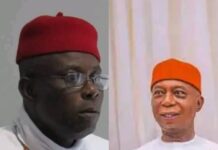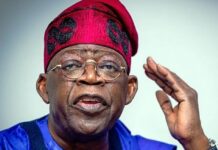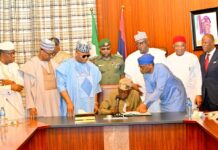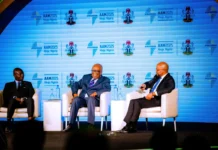Power sector operators and experts have raised concerns, expressed fears and projected opportunities as some states assumed responsibilities for regulating electricity markets within their various domains.
This follows the recent revelation by the Nigerian Electricity Regulatory Commission that seven states now control their electricity markets in accordance with the Electricity Act 2023.
The states are Enugu, Ondo, Ekiti, Imo, Oyo, Edo, and Kogi. Other states, including Lagos, Ogun, Niger, and Plateau, are expected to complete their transitions between June and September.
Anambra, having recently passed its electricity law, is also gearing up to join the list
Tinubu’s Electricity Act: Seven
Power sector operators and experts have raised concerns, expressed fears and projected opportunities as some states assumed responsibilities for regulating electricity markets within their various domains.
This follows the recent revelation by the Nigerian Electricity Regulatory Commission that seven states now control their electricity markets in accordance with the Electricity Act 2023.
The states are Enugu, Ondo, Ekiti, Imo, Oyo, Edo, and Kogi. Other states, including Lagos, Ogun, Niger, and Plateau, are expected to complete their transitions between June and September.
Anambra, having recently passed its electricity law, is also gearing up to join the list
Before President Bola Tinubu signed the new Electricity Act in 2023 with the Federal Government, through the Nigerian Electricity Regulatory Commission, the only agency regulating electricity in Nigeria.
However, the decentralisation of the sector by the Act has now given states the authority to control and regulate electricity within their domains, granting them the freedom to generate, transmit, and distribute power.
This marks a historic shift in Nigeria’s electricity governance, from a centrally regulated structure to one where states are empowered to generate, transmit, distribute, and regulate electricity within their borders and only submit to national oversight by the NERC.
This shift, while hailed by stakeholders as a leap towards energy decentralisation and market competitiveness, is already raising questions over capacity gaps, regulatory clarity, subsidy management, and potential friction between state and federal oversight. This is because NERC appears to be losing relevance in the very sector it was created to govern.
While officials at NERC expressed reservations about some states’ ability to manage their power markets, some industry experts said the development had created opportunities with challenges.
The PUNCH reports that the seven states who now have the power to generate, transmit, and distribute electricity, will as well regulate the same and grant approval to licensees without the influence of NERC.
The regulator also disclosed during a presentation at the power stakeholders’ meeting in Lagos recently that 11 out of the 36 states had commenced the process of transitioning to self-regulation of electricity.
Discussions at the meeting focused on the transition to state electricity markets, with participants highlighting current sector challenges and proposing practical and collaborative solutions.
“So far, 11 states have commenced the transition process, with seven states — including Enugu, Ondo, Ekiti, Imo, Oyo, Edo, and Kogi — already transitioned,” NERC stated in its presentation.
The stakeholders emphasised the importance of capacity building, regulatory coordination, and investment readiness to ensure sustainable, state-led electricity markets under the framework of the Electricity Act 2023
Once regulatory functions are transferred from the NERC, the states will regulate their electricity markets.
Before President Bola Tinubu signed the new Electricity Act in 2023 with the Federal Government, through the Nigerian Electricity Regulatory Commission, the only agency regulating electricity in Nigeria.
However, the decentralisation of the sector by the Act has now given states the authority to control and regulate electricity within their domains, granting them the freedom to generate, transmit, and distribute power.
This marks a historic shift in Nigeria’s electricity governance, from a centrally regulated structure to one where states are empowered to generate, transmit, distribute, and regulate electricity within their borders and only submit to national oversight by the NERC.
This shift, while hailed by stakeholders as a leap towards energy decentralisation and market competitiveness, is already raising questions over capacity gaps, regulatory clarity, subsidy management, and potential friction between state and federal oversight. This is because NERC appears to be losing relevance in the very sector it was created to govern.
While officials at NERC expressed reservations about some states’ ability to manage their power markets, some industry experts said the development had created opportunities with challenges.
The PUNCH reports that the seven states who now have the power to generate, transmit, and distribute electricity, will as well regulate the same and grant approval to licensees without the influence of NERC.
The regulator also disclosed during a presentation at the power stakeholders’ meeting in Lagos recently that 11 out of the 36 states had commenced the process of transitioning to self-regulation of electricity.
Discussions at the meeting focused on the transition to state electricity markets, with participants highlighting current sector challenges and proposing practical and collaborative solutions.
“So far, 11 states have commenced the transition process, with seven states — including Enugu, Ondo, Ekiti, Imo, Oyo, Edo, and Kogi — already transitioned,” NERC stated in its presentation.
The stakeholders emphasised the importance of capacity building, regulatory coordination, and investment readiness to ensure sustainable, state-led electricity markets under the framework of the Electricity Act 2023
Similarly, the electricity distribution companies operating in the seven states and other licensees would be controlled by the states, instead of the Federal Government’s regulatory commission.
In states where NERC has ceased to operate, the Discos hitherto operating in those states would be mandated to incorporate a subsidiary company to assume responsibilities for intrastate supply and distribution of electricity in those states.
For instance, as the Enugu Electricity Regulatory Commission commenced operations, the Enugu Electricity Distribution Company set up a subsidiary named Mainpower Electricity Distribution Limited, which was licensed by the state regulator.
This means that the main Enugu Electricity Distribution Company is now operating under different regulations. While some experts expressed worries over the development, others said it could be a positive turnaround for the power sector.
In line with the Electricity Act, the NERC has since April 2024 issued 11 transfer orders to states that have applied and met the necessary conditions. Each order comes with a six-month timeline for full operational handover.
For instance, Lagos and Ogun are set to complete the transition this month, Niger in July, and Plateau in September. Meanwhile, Anambra has formally set the ball rolling with the establishment of the Anambra State Electricity Regulatory Commission, following the passage of the state’s electricity law signed by Governor Charles Soludo.
Despite the optimism, industry sources warn that many of the states may not be adequately prepared for the complex regulatory and operational responsibilities ahead.
Operators worry
A senior official at NERC, who spoke to The PUNCH on condition of anonymity due to lack of authorisation to speak on the matter, said, “The new electricity market is more likely to impact distribution, which is also a stronghold in the value chain. Managing the new change in the electricity market is going to overwhelm the state governments.
“They actually don’t understand the implication of it yet, but NERC is doing everything in its power to make it easy for these states. A major issue is manpower; you need experienced hands to handle some issues, and if you can’t find someone to do that in your team, there will be issues.
“An issue as simple as setting a tariff, which is the most important thing for revenue generation, will be very difficult for the states because not many people in the whole of this country can set tariffs. Globally, only about 2,000 people have the expertise to set electricity tariffs correctly. Most states don’t have that expertise yet.”
The source added that manpower shortage, lack of technical experience, and poor institutional memory could derail the transition if not urgently addressed.
“Every month, we meet with the states and provide guidance. But challenges like asset delineation, where a single transmission line passes through multiple states, are already emerging. It’s a work in progress, but there will be hiccups,” the official warned.
Proponents of the Act argue that decentralisation is long overdue and necessary to attract private investment into Nigeria’s struggling power sector. But critics fear that the balkanisation of regulatory oversight could lead to confusion, conflicting standards, and even exploitation of consumers.
Another issue flagged is the subsidy. Under the new structure, each state governor would determine whether their administration will subsidise electricity for residents or allow market-based pricing. This could widen inequalities in electricity access across states.
Electricity theft and enforcement of penalties are also areas of concern. Under the new regime, NERC must hand over theft cases to state commissions, which don’t have trained enforcement teams on such issues.
“Delineation of assets is another challenge because one transmission line can pass through multiple states. It is a work in progress, but there will be hiccups on the way. Eleven states have applied. Subsidy is also another issue because it is the governor of each state who will determine if they will be paying the subsidy on behalf of citizens and how much they can pay. These are the loopholes.
“If the governor declines, it means everyone will pay for their power usage. Then electricity theft, will they have the capacity to handle it? The law says we have to hand over the case to them, and we can only hope they will handle it well. We are also sharing our experiences,” the NERC official noted.
Some states appear better positioned than others. Enugu State, for example, is regarded as the most prepared, having appointed an experienced regulator who was part of the founding of NERC. It has already issued operational regulations and begun enforcement.
A recent example is the sanctioning of MainPower Electricity Distribution Limited in Enugu. Following customer complaints of overbilling, the Enugu State Electricity Regulatory Commission ordered the company to refund overbilled units for April 2025, citing Section 35 of the state’s Electricity Law 2023.
Lagos is also said to be making steady progress, leveraging its previous experience in embedded generation and independent power projects. The LASERC has also released its first major order on the provision of electricity services by individuals or entities in Lagos State without a licence or permit
The directive, titled ‘’LASERC ORDER/001/2025’’ and released recently, formally brings electricity market operations under the agency’s exclusive control.
The Convener and Executive Director of PowerUp Nigeria, a power consumer advocacy group, Adetayo Adegbemle, raised concerns over the pace and seriousness of states that have taken up regulatory autonomy in the electricity sector following the decentralisation of electricity governance.
Speaking on the unfolding development, Adegbemle said while the decision to decentralise electricity regulation was a welcome and progressive one, many of the states that sought autonomy seemed unprepared for the practical responsibilities that come with it.
“From the onset, it was clear that any state seeking to assume electricity regulatory oversight within its domain would be taking on a heavy burden,” he said. “Yes, we’ve seen 11 states obtain approval for autonomy, but the truth is many of them are yet to move beyond the paperwork. It’s one thing to declare interest, it’s another to actually roll up your sleeves and get the work done.”
Adegbemle noted that out of the 11 states that had secured autonomy, only four have gone ahead to establish any form of regulatory framework or policy direction, while the rest have remained inactive.
“There’s no visible sign of regulatory activity in most of these states. They’ve written to the Nigerian Electricity Regulatory Commission, received the green light, but stopped there. No laws. No institutions. No implementation. It appears many of them are only playing to the gallery,” he said.
Punch News



















